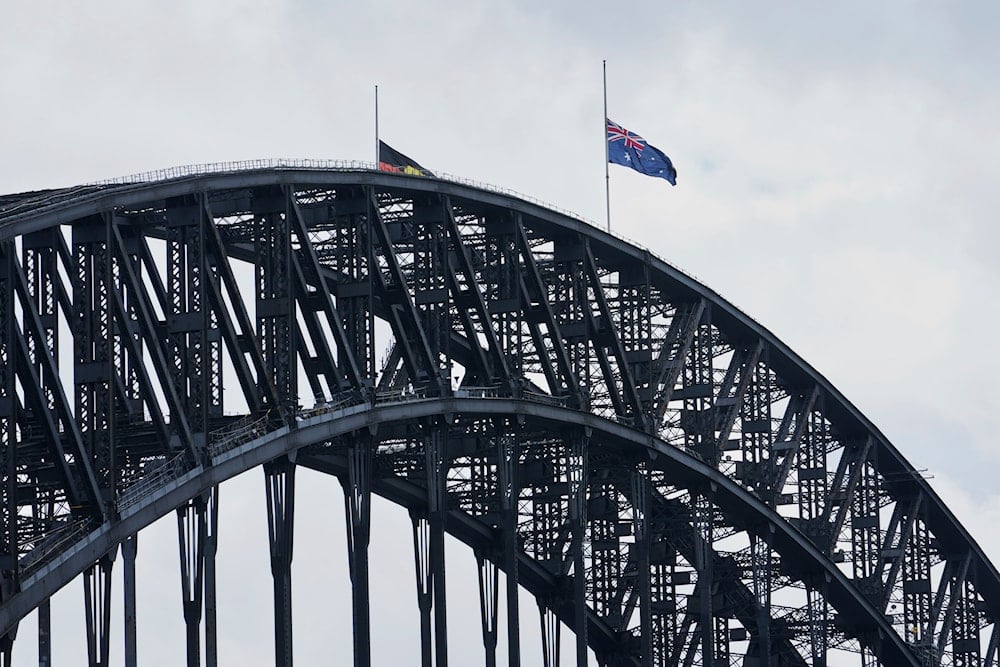Australia strikes $400M deal to offshore deportees to Nauru
Canberra faces backlash over secretive deal to relocate visa-cancelled individuals to Nauru, raising concerns about human rights and regional pressure.
-

Flags fly at half mast atop of the Sydney Harbour Bridge, in Sydney, Australia, Tuesday, April 22, 2025. (AP)
Australia has formalized a $400 million agreement with Nauru to deport hundreds of foreign-born individuals whose visas were revoked on character grounds. Home Affairs Minister Tony Burke traveled to Nauru on Friday to sign a memorandum of understanding (MoU) with President David Adeang. Under the agreement, Canberra will provide an upfront payment, plus $70 million annually.
The arrangement concerns around 280 non-citizen former detainees, known as the NZYQ cohort, who previously faced indefinite immigration detention. Deportation to their home countries was not possible due to the risk of persecution or outright refusal from those countries to accept them. A High Court ruling in November 2023 deemed indefinite detention unlawful when there is “no real prospect” of removal in the “reasonably foreseeable future,” resulting in their release into the community.
In a statement published on the Home Affairs Department website, Burke said the MoU “contains undertakings for the proper treatment and long-term residence of people who have no legal right to stay in Australia, to be received in Nauru.”
He added that the funding would “underpin this arrangement and support Nauru’s long-term economic resilience.” Burke further stated: “Anyone who doesn’t have a valid visa should leave the country. This is a fundamental element of a functioning visa system.”
Political backlash and secret claims
The announcement drew criticism from Greens Senator David Shoebridge, who accused the government of “dumping this on a Friday when no one is looking.”
He condemned the decision to post the statement online without holding a press conference, arguing: “At a time when we should be building partnerships in the Pacific based on equality and respect, the government is instead forcing our smaller neighbours to become 21st century prison colonies.”
Earlier this year, Australia and Nauru reached a separate financial deal to resettle three members of the NZYQ cohort, described by the federal government as violent offenders.
At the time, Adeang said the men had “served their time” in Australian prisons and were no longer subject to punishment, adding: “Australia is trying to send them back to their country but they are not wanted back home. So we accepted them from Australia. They are not Australian and Australia doesn’t want them.”
However, the three individuals have filed appeals challenging their deportation, having been found neither to be refugees nor entitled to protection. The new MoU sets the stage for more deportations, though it remains unclear whether additional legal challenges will follow.
Legislative changes and procedural fairness
This week, the federal government introduced legislation removing procedural fairness from deportation decisions involving foreign-born criminals, including the NZYQ cohort.
On Thursday, Burke told Parliament that such provisions were being exploited “to delay and frustrate their removal, at cost to the Commonwealth in circumstances where it is neither necessary nor appropriate for it to continue to apply.”
He said the bill would ensure deportation actions “are not conditioned on an obligation to afford procedural fairness.”
The Senate later rejected a Greens motion to launch an inquiry into the legislation, which Shoebridge denounced as “one of the nastiest, meanest attacks” on multicultural Australia.
Read next: Australia denies visa to two IOF soldiers over 'war crimes' questions

 3 Min Read
3 Min Read








